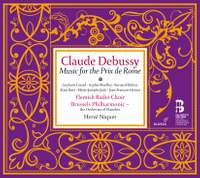Recording of the Week,
Debussy and the Prix de Rome
French composer Claude Debussy first entered the Prix de Rome in 1882 aged just 20. It was a very important competition for young French composers with the prize for the winner including a four-year residence at the Villa Medici (the French Academy) in Rome, where they could meet new people and develop their compositional style further. The competition rules required a series of compositions to be written but, as Debussy knew only too well, to win you had to compose within a rather formulaic style in order not to offend the tastes of the judges. Debussy took two years to master this ‘game’ (as he called it) with his winning piece in the 1884 competition L’Enfant prodigue winning enough of the votes to land him the prize. Ravel, incidentally, attempted and failed to win the Prix de Rome on five occasions, his last effort in 1905 with his String Quartet in F major, which is now of course one of the cornerstones of the chamber music repertoire. This shows perhaps more than anything the rather limited scope which the jury gave composers to venture outside the ‘expected style’.

It is worth remembering that Debussy was still very young when he arrived in Rome, and it wasn’t really until the early 1890s that he developed the unique musical language with which he is now associated (most notably with his Prélude à l'après-midi d'un faune (1894) which with its very loose grip on tonality and harmonic function, composer-conductor Pierre Boulez believes marked the beginning of 'modern music'). However, his compositional voice before and during his Rome period is still very individual and as I have discovered recently there are some fine works that date from these years which seem to have been unjustly neglected.
It is thanks to Hervé Niquet and a new project from French record label Glossa that hopefully this neglect can now be redressed a little, as they have just released a new two CD set of these little known compositions. In addition to the winning 1884 piece L’Enfant prodigue there is also Debussy's 1883 effort Le Gladiateur and three shorter choral pieces which Debussy wrote for an earlier round of the competition. Also included are some of the pieces which Debussy wrote and sent back from Rome which was one of the requirements of winning the competition. The excellent booklet notes include some of the responses to these works from the Academy in Paris and they make quite entertaining reading describing his compositions with words like “bizarre”, “peculiar” and “unintelligible”, while it is thankful that he took absolutely no notice of their thoughts on his work Printemps!:
"It is desirable that he should have his guard up against that vague impressionism which is one of the most dangerous enemies of truth in artistic works."
The performances here are very good, with excellent soloists superbly supported by the Flemish Radio Choir and Brussels Philharmonic. Conductor Hervé Niquet, more generally associated with early music, clearly has a real passion for French music and achieves an excellent balance between the voices and the orchestra. I’ve given you a couple of samples below where you can hear a duet from Debussy’s failed 1883 attempt Le Gladiateur (which you’ll be unsurprised to hear that the jury found “overindulgent”) and the opening prelude to his successful 1884 attempt L’Enfant prodigue. Enjoy!
Debussy - Music for the Prix de Rome
Guylaine Girard (soprano), Sophie Marilley (mezzo), Bernard Richter (tenor), Alain Buet (baritone) & Marie-Josèphe Jude, Jean-François Heisser (pianos), Flemish Radio Choir & Brussels Philharmonic, Hervé Niquet (direction)
Available Formats: 2 CDs, MP3, FLAC



